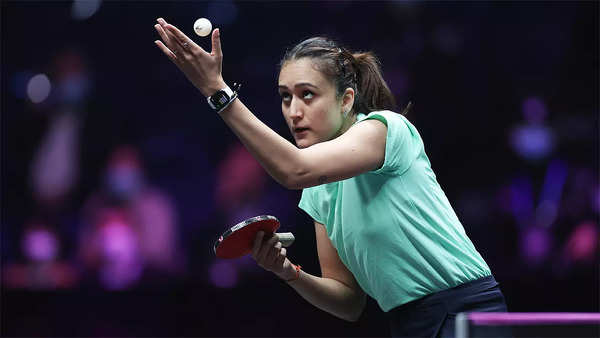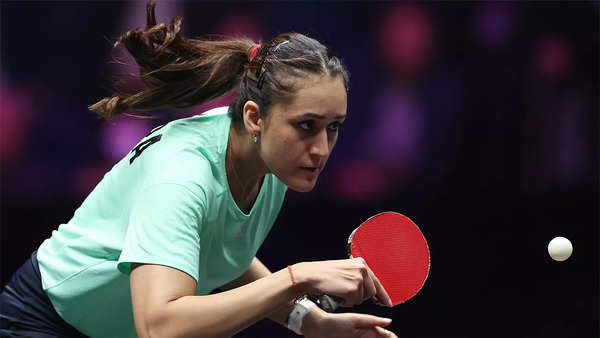Despite a formidable clash in the round of 16 against China’s Wang Yidi, resulting in a 0-3 defeat, Batra’s journey in Frankfurt was marked by a thrilling victory over Hong Kong‘s Doo Hoi Kem in the round of 32, triumphing 3-2. As a result, Manika stands as the sole Indian representative within the top 50 rankings in women’s singles.
In an exclusive chat with TimesofIndia.com, the 28-year-old Delhi-born TT star delved into her rise in the world rankings, the benefits of mental strengths in matches, her unwavering commitment to elevating Indian table tennis to new heights, aspirations for the upcoming Paris 2024 and much more.
Firstly, how does it feel to achieve a career-high ranking?
First of all, of course, I’m really happy with my career-high ranking. I’m happy but not satisfied because I have different targets and different goals, which is to be in the top 10. So yes, I will just keep on working hard for this but of course, yeah, I’m happy with my new ranking and it’s a result of dedicated training, and then what I have, my supportive team, my family, friends, and constant drive to improve. So I’m really happy with this and I’m thankful to everyone who really supported me in my journey.
Manika Batra. (Photo by Lintao Zhang/Getty Images)
In the WTT Champions tournament in Frankfurt, you reached the round of 16. Can you share the experience of playing against top-level competitors like Wang Yidi of China?
If you see, there are WTT Contender, WTT Star Contender, and WTT Champions. Champions is the toughest because only the top 32 players play (there). And there, all the top and the best players take part. I think I played really well In my first round against Doo Hoi Kem and this was my first win in WTT Champions in the round of 32. So I’m really happy with my performance.
But of course, with Wang Yidi, she won the tournament and she’s a great player. I gave her a tough fight. It is always a close match between me and her. The last three times I have played against her, all have been close, be it in the Nation games or before that in the WTT tournament. I think I will work hard. I have learned many things from this tournament and I’ll just work hard and I’ll focus on finding my skills and strategies with my coach Aman Balgu for my future competitions.
Why do you think nations like China, Korea, Japan and Chinese Taipei are so dominant in Table Tennis?
Nations like China, Korea, Japan and the Chinese Taipei have a rich history. In India, it is cricket. Especially in China, they have table tennis. I have seen that they start playing table tennis at the age of 2 or 3. They have great infrastructure and talent. It’s Table Tennis and here cricket, as I said. So that mattered a lot because the grassroots facility there is extremely strong for the players. The techniques and the level of skills are very strong. And that’s why they have that dominance, but I think we are also working hard now and our infrastructure has also changed over the years. So I’m really happy with that and the young players are also very talented and hard-working.

Manika Batra. (Photo by Lintao Zhang/Getty Images)
How do you see India’s overall performance in TT in the last Asian Games?
If I honestly talk about my game, it was great. Of course, I am not satisfied. But I feel that when I played against Wang Yidi in the quarterfinal, I had the chance to reach the next round and win a medal. I played my best over there. I gave my 100% to win. The fear that we won’t be winning against China is easing now, and we can win against them. It’s not tough because we are really working hard. Yes, the medal in the doubles from Sutirtha Mukherjee and Ayhika was a great performance by them. Overall, India’s performance was great, and that is good.
Why do you think the popularity of cricket has escalated so quickly while other games, including TT, have not seen that rise?
As I said before also, cricket is rooted in everyone here from the start. Basically, cricket is an Indian sport now, everyone loves watching. And me too, I love to watch cricket; I don’t always get time to watch it. But I love cricket because it’s a sport. And I’m an athlete, so I love all the sports.
As I talked about the grassroots level, if a family wants their child to play sports, it will be cricket, a sport watched by all. That said, a lot of changes have happened in other sports too. More parents are now putting their children in badminton, table tennis, and tennis. So there are many sports that are growing.
When it comes to sports other than cricket, we can focus more on the grassroots level. Young athletes who are coming through — supporting them and keeping tabs on their talent are fundamental.
How do you prepare for mega events like the Olympics, Commonwealth Games or Asian Games?
For me, every tournament is important, be it WTT tournaments or the Olympics. The Olympics, of course, is a big event. But for me, every tournament is as important as the Olympics. My routine is almost the same, it is like every day working hard and disciplined physically, mentally, and health-wise. I just have to keep on improving. When I come back from a tournament, I reflect upon the learnings from the last tournament and try to eliminate those mistakes so that I don’t repeat them next time. I just want to give my hundred percent. When I go to any tournament, I try to forget everything else and just play for myself, my country and my well-wishers.

Manika Batra. (Photo by Lintao Zhang/Getty Images)
Are you planning to train extra before the Olympics next year?
I always put in extra effort for every tournament, not only the Olympics. Like I said, every tournament is important for me. Yes, the Olympics is a huge event, but it is only in our minds. If we start taking every tournament that we have to win and we have to give our hundred percent, we will prepare ourselves like that. We have qualifications left for the Olympics but yes, I will prepare my best to play better than what I did last time in the Olympics and bring a medal for India.
What is your routine for mental preparation?
If you see not only with me but also with other players, there are moments when you feel nervous and that’s normal. If you are playing at that level, nervousness will be there. But yeah, I do some mindfulness exercises, visualisation, and then some meditation I regularly do to keep myself calm. For example, when it is a decider or 10-10 (points), I do some breathing exercises which really help me. Physical fitness is necessary in every sport, but keeping your mind calm is also important nowadays.
How do you deal with negativity in this era of social media?
Negativity will be there. If you are playing or even in normal life, if you’re at that level, people will say (stuff) about you. But honestly, I focus more on positivity because if you focus more on those (negativity), it will always be in the back of your mind. I don’t ignore that, of course, I accept that and I just keep on working because the love for the game is the main thing for me and so I just accept that and just keep on going. And also, I see the love and the support too. Rather than focusing on negativity, I just keep on going and working hard. You can always see that attachment in hate. Yes, you just have to think that they are saying something for a reason. It’s their thinking. You just have to do your work.
What do you need to possess to be a world-class player in TT?
World-class table tennis players need a combination of technical skills and agility. We really need that. Then, of course, mental toughness, which is very very important nowadays. And strategic thinking means how to play, and what to do against different oppositions. These are the things we need to do, to sit with the coach and discuss before every match. So these things are really important, and I really work on these things to be successful.
When you started playing TT and today’s TT, what changes are you seeing in India? What’s the future like in TT?
I have seen so many positive changes which are happening in India, not only in TT but in other sports as well. Of course, it includes awareness, which was not there before. Now, it is growing in the masses, just as badminton came to the scene after the success of Saina Nehwal and PV Sindhu. Table tennis is growing right now. And I’m really happy with that and what support we are getting is really huge.
The future looks promising with the growing young talents. If you see now, young girls and boys, they’re doing really well in international events.
How would you convince parents to let their child play TT?
I would tell them to let their children do what they want. Of course, sport is the thing, in which there is a disciplined environment, focus, determination and teamwork. So these are the things only sports can give and personally, I have learned many things from table tennis. And to be disciplined to get up early, to have a good, healthy diet, these things are really important for every kid’s life. I will convince them by saying that sports can give many good things and happy moments that other things won’t be able to deliver. So let them play.





